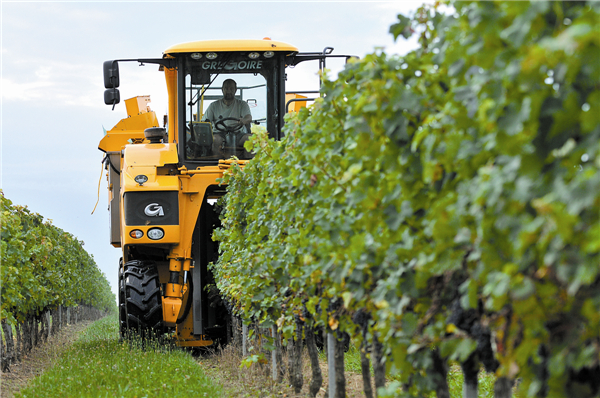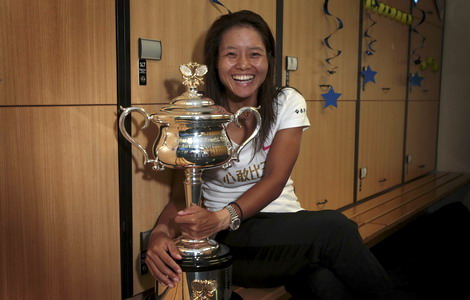From vineyards of Bordeaux to Chinese cellars
Updated: 2014-01-27 08:30
By Dong Fangyu (China Daily)
|
|||||||||||
 |
|
A harvester picking grapes during the 2011 harvest. One machine can harvest as many grapes as 80 workers can pick by hand. Jon Wyand / for China Daily |
The biggest wine deal in Chinese history ended in tragedy last month when billionaire Hao Lin, his 12-year-old son and two other people were killed in a helicopter crash, their aircraft plunging into the River Dordogne as they toured a chateau and vineyard in Bordeaux.
The 46-year-old hotel tycoon had just purchased the historic Chateau de la Riviere for a reported 30 million euros ($41 million), to date China's biggest deal by value in the estates of one of the world's most famous regions for fine wine.
Hao's purchase highlighted the growing influence of Chinese investors in the French region in recent years. There are approximately 8,000 chateaus in the Bordeaux area and around 70 of them have been bought by Chinese investors, according to an e-mail from Karin Maxwell, one of the founding partners of Bordeaux-based real estate broker Maxwell-Storrie-Baynes, an exclusive affiliate of Christie's International Real Estate.
Chinese interest has been so great that Maxwell-Storrie-Baynes has a dedicated China desk. According to Li Lijuan, who is in charge of the desk, Chinese investors have been involved in more than 20 transactions over the last 12 months.
"One can only gain a vague idea of the number of Chinese vineyard owners in Bordeaux. Some rich Chinese investors hold Western passports, while others keep a low profile and demand nondisclosure of their transactions," she said.
Chinese entrepreneurs now own almost 1 percent of Bordeaux's chateaus. That figure may be small, but it indicates a shift in the social status of Chinese people in France, according to Li.
The chateaus and vineyards are associated with the upper echelons of French society, and while an apartment in Bordeaux will cost around 200,000 euros and a villa 400,000 euros, buying a vineyard costs millions, generally more than 10 times the price of regular property.
"There's no doubt that the local people were surprised when the Chinese - who until recently were usually stereotyped as restaurant staff - suddenly came to buy their chateaus", said Li.
Cultural concerns
Because wine making is an integral part of French culture, some locals have expressed concern that the sales of chateaus to the Chinese will result in a diminution of their heritage, according to media reports.
However, Jonathan Ducourt, sales manager of Vignobles Ducourt in Bordeaux, doesn't share that opinion. The Ducourt family has been in the wine business since 1858 and is currently the region's largest wine-producing group by family corporation, with estates covering 440 hectares and 13 chateaus.
 |
 |
Related Stories
China will set pace for wine industry growth 2013-03-11 10:31
China mulls plan to boost wine industry 2012-03-16 14:05
Toasting the future of China's wine industry 2010-02-01 09:42
New territory shows grape promise for wine travelers 2013-12-29 08:19
New museum’s most valuable artifact held wine 2013-12-11 17:26
European Wine and Food Festival 2013-11-01 15:10
Today's Top News
8.8% salary hikes expected for 2014
China turns the tables on gamblers
China takes measures against H7N9
Terrorists behind twin explosions in Xinjiang
2014 diplomatic strategy outlined at Davos
China reports another H10N8 case
Big events in the Sino-French relations
IMF chief warns of risks to recovery
Hot Topics
Lunar probe , China growth forecasts, Emission rules get tougher, China seen through 'colored lens', International board,
Editor's Picks

|

|

|

|

|

|





